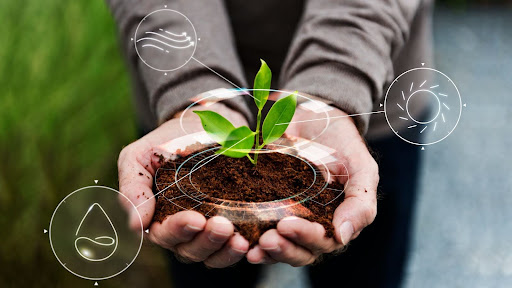Ever wonder how Indian farmers can produce more food with less negative impacts on the environment in order to save land for the future? The core of this question constitutes the basis of sustainable agriculture, a practice changing Indian farming by trying to balance the concept of production and responsibility toward the environment. This becomes vital in sustainable agriculture technology since India faces challenges in changing weather patterns, lack of water, and increase in population. In an attempt to adopt modern agriculture techniques, farmers can maximize their productivity, save resources, and sustain communities.
This blog will explore what sustainable agriculture really is, strategies in India, top new technologies that are making a difference, and how these modern tools are changing the ways farming practices work across the nation. Let’s take a dive into the future of Indian agriculture!
What Is Sustainable Agriculture?
Sustainable agriculture is a farming system that produces food, fiber, or other plant and animal products using practices that protect the environment, public health, human communities, and animal welfare. Its major emphasis is on the long-term health of soil water and other resources essential to farming, which would make the resource base available for use and benefit future generations as well. Sustainable agriculture doesn’t merely try to do less damage but to work for the betterment of the land, conservation of resources, and preservation of biodiversity.
As agriculture is an activity of necessity and constitutes a large part of the Indian population, it is essential to develop sustainable agricultural solutions that increase productivity and sustain the resource base of natural resources. The changes in weather patterns, lack of water, and constant increase in population are normally overcome by the farmers of the country through sustainable agriculture technology.
Strategies and Practices for Sustainable Agriculture in India
There are various approaches that may be employed in the context of India to promote sustainable agriculture. Modern agricultural technology in India makes productivity comparable to environmental conservation for farmers. Among some of the important approaches, there are the following:
- Soil Management: Crop rotation and organic manure improve soil fertility. There is no need for chemical input in such practices.
- Water Conservation: Drip irrigation and rainwater harvesting conserve the water, thereby saving for the farmer to effectively use it.
- Agroforestry: Introducing trees and shrubs into farms can assist biodiversity and offer shade, besides improving the quality of soil.
- Precision Farming: Digital agriculture technology integrates data-driven insights to optimize farmers’ resource use of water and fertilizer.
- Climate-Resilient Crops: Using crop varieties that can resist extreme weather can help reduce the impact of climate change on agriculture.
- Integrated Pest Management (IPM): Biological control and organic pesticides help control pests without harming the environment.
These strategies together promote an approach to farming that protects the environment, enhances biodiversity, and builds resilience against the unpredictable elements farmers often face.
List of Top 10 New Technologies in Agriculture
Modern farming in India takes advantage of organic farming technology to increase crop yield, minimize waste, and conserve resources. Here are the top 10 agriculture technology solutions revolutionizing Indian agriculture:
- Drones: They can be used in crop surveillance. Therefore, the information in real-time helps a farmer know what the situation with the crop is and what action to take.
- IoT: IoT devices deal with the collection of soil moisture, temperature, and growth of crops, aiding farmers in making decisions.
- Artificial Intelligence and Machine Learning: These technologies aid data analysis to provide information about crop yield prediction, pests, and crop health management.
- Blockchain: The same provides transparency in the chain of supply, and that is why blockchains are helpful in the cultivation of quality and authentic crops.
- Hydroponics and Vertical Farming: Hydro and vertical farming allows people to cultivate crops in space-crunching areas and opens up the possibility of a career in agriculture for anyone in the urban regions.
- Remote Sensing: Satellite image remote sensing helps farmers monitor their large farms and make informed decisions on irrigation and the health of crops using technology.
- Smart Irrigation Systems: Smart irrigation is the usage of data in watering control for the proper quantities of water at the correct time for crops.
- Genetic Engineering: With genetic engineering, crops could be made resistant to diseases and pests, as well as extreme weather conditions.
- Biotechnology: Biotechnology offers natural means for better seeds, productive soil fertility, and insect resistance.
- Mobile Applications: Apps on mobile offer weather forecasts for various areas of crop advisory that help the farmer decide while increasing market prices. A best farming app could help in making decisions relatively easier for the farmer.
These all form part of the innovative inputs of sustainable agriculture solutions put forward in solving specific agricultural-related problems for Indian farmers, thus making agriculture more productive and sustainable.
Uses of Modern Technology in the Farming Sector in India
The implementation of agri-technology solutions has brought significant benefits to Indian agriculture, with increased productivity and the efficient use of resources. A few examples of modern technology helping are as follows:
- Data-Driven Decisions: With data analytics and predictive models, there is a better understanding of what crops need, yield, and optimal times for scheduling irrigation and harvesting.
- Enhanced Resource Efficiency: Accurate farming allows for efficient management of inputs like water, fertilizers, and pesticides, thus reducing costs while limiting their effects on the environment.
- Improved Crop Health Monitoring: Crop health monitoring will be improved through the deployment of technologies such as the use of drones, IoT sensors, and AI on early warning signs of any crop health issues to promptly correct them.
- Supply Chain Optimization: The digital platforms increase transparency and traceability between farmers and consumers with fewer middlemen disturbances.
- Sustainable Livestock Management: Wearable devices from the IoT monitor livestock health. Thus, it has ensured fewer mortalities and increased care for the animal.
- Weather Forecasting: This system provides updates to digital platforms about the weather. These are used by farmers to predict changes in the weather to minimize crop loss and provide a better harvest.
Modern agriculture technology in India will bring new and innovative solutions toward making agriculture more productive, profitable, and sustainable, and ASQI-type companies have also made all such technologies available to small Indian farmers.
FAQs Related to Digital Agriculture Technology in India
Q. What is digital agriculture technology?
This improves the process of making judgments in agriculture by means of data and digital equipment applied in technology, for instance, in mobile apps and IoT and AI, to eventually produce a better yield for sustainable production.
Q2: What is precision agriculture’s role in the world of sustainability?
A. Precision agriculture applies data or digital means to reach any specific requirements within the specific territory inside a farm, meaning effective distribution of all resources in consumption instead of wasting them; besides, an increase in product yield.
Q3: Does modern agriculture technology benefit a small farmer in India?
A: Absolutely. Several agriculture technology solutions are very cost-effective and user-friendly, therefore helpful for even small-scale farmers too who can now profit from enhanced productivity and efficiency.
Q4: Can AI find its space in agriculture?
A: AI can scrutinize significant amounts of farmland information to predict trend lines and early issues along with serving personalized recommendations for farmers by being a central part of sustainable agriculture technology.
Q5: What kind of improvement can blockchain help Indian farmers produce?
A: Improvement in blockchains improves supply chain transparency so the farmer gets buyer trust on his product at the market and is valued accordingly without being under-charged by the trader at the store.
ASQI aims to bring positive change to agriculture in India with innovative agri-technology solutions that help farmers produce more from less and preserve the environment for the next generations.







